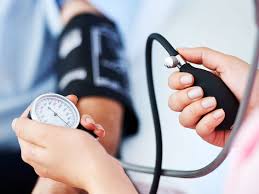Three warning signs of High blood pressure

High blood pressure also known as "Hypertension" can slowly develop and damage your body for years; and over time, if high blood pressure causes enough damage, it can increase your risk of having a stroke or heart attack.
It's a dangerous condition, but what makes it even more dangerous is that high blood pressure doesn't usually present with many (if any) symptoms—in fact, it's often called the "silent killer." But this doesn't mean you're completely out of luck when it comes to diagnosing and treating hypertension.
120 over 80 (120/80) is considered the normal range for blood pressure, per the American health association. While there are some risk factors that can contribute to high blood pressure—like smoking, high stress levels poor diet, not enough exercise, and genetics—symptoms of hypertension aren't quite as cut-and-dry.
That's because any possible symptoms that could be related to high blood pressure could also be indicative of other health conditions.
Here's what you need to know about high blood pressure and how it may present in those affected by it.
- Blood spots in the eyes: This condition—technically called subconjunctival hemorrhage—is more common in those with diabetes and high blood pressure, though neither directly causes the blood spots, per the America Heart Association (AHA).
- Facial flushing: The AHA says facial flushing happens when blood vessels in the face dilate. While facial flushing may occur with high blood pressure, it can also be a result of various other factors like sun exposure, cold temperature, spicy foods, and skincare products.
- Dizziness: While dizziness isn't directly caused by high blood pressure, the AHA says that sudden onset dizziness, loss of coordination and balance, and trouble walking should not be ignored, since they can be indicators of a stroke (for which high blood pressure is the leading cause).
That said, while higher-than-normal blood pressure often doesn't show specific symptoms, a hypertensive crisis—when blood pressure rises quickly and severely, and reads 180/120 or higher—can show some more specific symptoms and necessitate immediate medical attention, according to the AHA. These emergency symptoms include:
- Severe headache
- Shortness of breath
- Nosebleeds
- Severe anxiety
The takeaway here? Get your blood pressure checked regularly and listen to your doctor if they advise you to lower your blood pressure. Unlike other medical conditions, you can’t count on a symptom to signal to you that your blood pressure is dangerously high, so it’s important to try to keep your blood pressure under control consistently, especially if a medical professional suggests that you need to.
Finally, quit harmful habits such as smoking and excessive drinking, eat healthy, cut out street, sleep well and exercise regularly.
Source: Health.com
